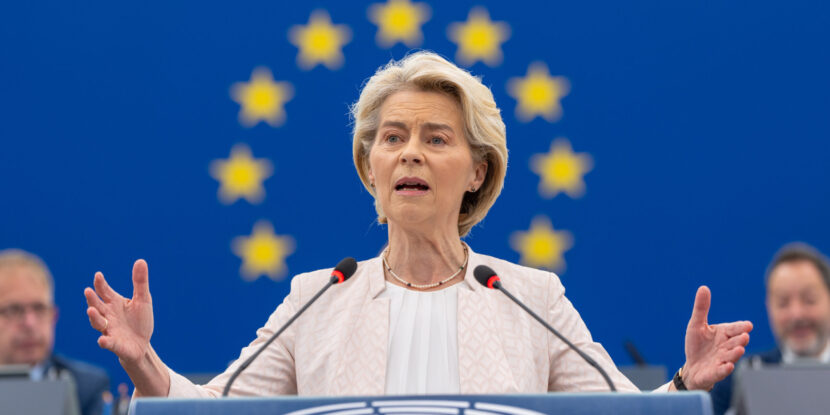
PULSE POINTS:
❓What Happened: The European Union (EU) wants to establish a “maritime security hub” in the Black Sea region to counter Russia’s “shadow fleet” and protect undersea cables.
👥 Who’s Involved: The European Commission, EU members Romania and Bulgaria, Georgia, Moldova, Turkey, Ukraine, and NATO.
Your free, daily feed from The National Pulse.
📍 Where & When: Black Sea region; proposal released Wednesday, May 28, 2025.
💬 Key Quote: “Turkey can play a constructive role on countering Russia’s shadow fleet,” the European Commission argues.
⚠️ Impact: The hub aims to enhance maritime security, monitor ceasefires, and improve EU relations with Turkey, which are strained despite its status as an official candidate for EU membership.
IN FULL:
The European Union (EU) is proposing the creation of a “maritime security hub” in the Black Sea region to confront Russia and protect critical infrastructure, including undersea cables, according to a European Commission document released Wednesday. Despite the appeal to regional security, the move could be seen as a significant provocation against Russia, whose ongoing invasion of Ukraine is in part aimed at securing greater Black Sea access.
According to the European Commission document, the initiative would focus on enhancing maritime capabilities for “real-time monitoring from space to seabed” and establishing an early warning system for potential threats. The hub, which EU officials suggest could be located in member states Bulgaria or Romania, would also support ceasefire negotiations and monitoring efforts in Ukraine and the broader Black Sea region. The proposal comes amid heightened concerns from Black Sea nations, including EU members Romania and Bulgaria, over Russia.
Kaja Kallas, the EU’s top diplomat, emphasized the importance of a ceasefire before the hub’s full potential could be realized. “But first, we need to have a ceasefire,” she remarked, referencing a prior U.S.-brokered attempt that failed due to a lack of Russian compliance.
Turkey, which controls maritime traffic through the Bosporus Strait, is identified as a key player in the success of the proposed security measures. The European Commission noted that Ankara could “play a constructive role on countering Russia’s shadow fleet” and contribute to efforts aimed at bolstering maritime safety and energy security. The Russian “shadow fleet” is a collection of aging vessels that the country uses to circumvent oil sanctions imposed by the U.S. and EU.
In recent months, Turkey has indicated its willingness to participate in a future European “reassurance force” for Ukraine, which could include maritime assets to monitor a ceasefire. However, EU-Turkey relations remain fraught, with longstanding disputes involving EU members Greece and Cyprus and Turkey’s accession to the EU being stalled for over a decade.
EU Enlargement Commissioner Marta Kos suggested that the Black Sea strategy could help foster “good neighbourly relations” with Turkey. However, she refrained from addressing the broader issue of Turkey‘s EU membership ambitions.

PULSE POINTS:
❓What Happened: A study published in the Canadian Journal of Cardiology suggests moderate Champagne consumption may reduce the risk of sudden cardiac arrest.
👥 Who’s Involved: Researchers analyzed data from over 500,000 individuals; commentary provided by cardiologists and nutrition experts, including Bradley Serwer, MD, and Michelle Routhenstein, RD.
Your free, daily feed from The National Pulse.
📍 Where & When: Study findings published in the Canadian Journal of Cardiology last month.
💬 Key Quote: “Moderate consumption of alcohol may exhibit cardioprotective effects, yet it often poses risks to the liver, stomach, and mental health,” said Bradley Serwer, MD.
⚠️ Impact: While moderate Champagne or white wine consumption may correlate with reduced cardiac arrest risk, excessive alcohol use remains linked to significant health risks, including liver damage and disrupted sleep.
IN FULL:
A recent study published in the Canadian Journal of Cardiology has identified a potential link between moderate Champagne consumption and a reduced risk of sudden cardiac arrest. Researchers analyzed data from over 500,000 individuals, examining 56 non-clinical risk factors such as lifestyle, socioeconomic status, and physical health. The study concluded that 40–63 percent of sudden cardiac arrest cases could have been prevented by addressing a few modifiable factors.
Among the findings, moderate consumption of white wine and Champagne, combined with a healthy diet and positive lifestyle habits, was associated with a lower risk of cardiac arrest. “Moderate consumption of alcohol may exhibit cardioprotective effects, yet it often poses risks to the liver, stomach, and mental health,” said Bradley Serwer, MD, an interventional cardiologist.
Experts suggest the heart-health benefits of Champagne may stem from its polyphenol content, which improves vascular function, reduces inflammation, and raises HDL cholesterol, explained Michelle Routhenstein, RD, a preventative cardiology dietitian. Additionally, both white wine and Champagne contain protocatechuic acid, an antioxidant that combats free radicals linked to chronic illness and heart disease.
Red wine, similarly, offers potential cardiovascular benefits due to its high levels of resveratrol, a polyphenol that may lower blood pressure and reduce blood clots. However, medical professionals caution against excessive alcohol consumption, which can lead to liver damage, cognitive decline, and other health issues.
The findings did not specify optimal consumption levels, but “moderate consumption” is generally defined as up to two drinks daily for men and one for women, according to Laura Catena, MD. She insisted that drinking less is always better for overall health.
The World Health Organization (WHO) maintains that no alcohol consumption is entirely safe. At the same time, the National Academies of Sciences, Engineering, and Medicine have noted lower mortality rates among moderate drinkers compared to abstainers.
Ultimately, healthcare professionals advise individuals to weigh the risks and benefits of alcohol consumption carefully. For those with chronic illnesses or substance use risks, abstinence is recommended. “If there are questions whether alcohol may be beneficial, I recommend sitting down with your healthcare team to determine if it’s right for you,” Serwer advised.
show less

 1 month ago
2
1 month ago
2








 English (US) ·
English (US) ·